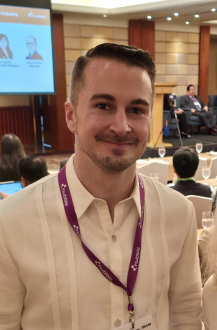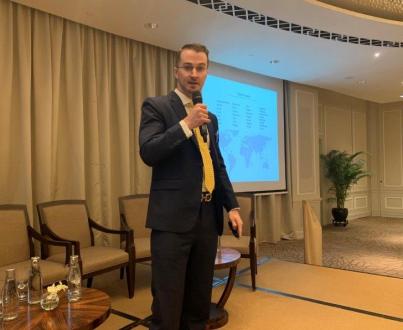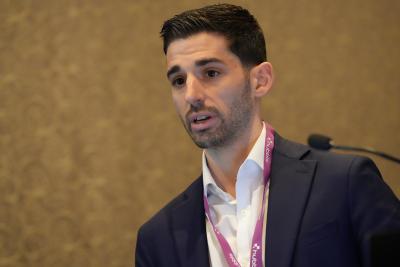Henley & Partners: Global Residence and Citizenship Options for Asia’s Wealthy

Scott Moore, IMCM of Henley & Partners
Apr 18, 2019
Scott Moore, Country Head for the Philippines based in Singapore at investment migration firm Henley & Partners, sees bountiful prospects for Asia’s HNWIs to choose from a suite of alternative overseas residence and citizenship options. Daphne Chandra, Country Head for Indonesia also joined the talk to highlight some of the best opportunities at the Hubbis Independent Wealth Management Forum in Singapore.
Henley & Partners opened its Singapore office more than five years ago and has seen a dramatic increase in business in the region. In 2018, applicant submissions in Southeast Asia (out of the Singapore office) increased 48% year-on-year for both residence and citizenship programs (versus 2017 figures). The firm has a history spanning over 20 years with more than 300 staff across the world in 32 offices. The team handles alternative residence and citizenship options for HNWIs and their families, as well as advises on and helps structure programmes for governments. For example, a more recent assignment was to advise the government of the Republic of Moldova to structure their Citizenship by Investment program.
To access wealthy individual or family clients, Henley has a long history of working with a variety of private banks and wealth management firms across the region, as well as with legal and other advisory and services firms to connect to these niche clients. The firm works especially closely with independent firms and has a transparent remuneration arrangement for introductions from such firms on these initiatives. Henley & Partners’ business is not in any way competitive to the independent wealth management institutions, but rather complementary, meaning that there are no barriers to wealth managers approaching them or in referring their clients to them.
Asia: opportunity aplenty
Moore began by highlighting some recent data from a Knight Frank report, that showed that in fact in Asia HNWIs are the least likely to have multiple nationalities thus far. “There are accordingly a lot of opportunities here and we are seeing a huge amount of growth in the market for obtaining alternative citizenship,” he reported.
Moore explained that Henley & Partners currently promotes nine citizenship programmes and with this range of options, operates similarly to an advisory firm. “When I sit down with the client,” he explained. “I find out what their family situation is, and how much they can invest, we then come up with one or two recommendations that make the most sense for the clients.”
Moore reported that Henley & Partners’ two decades of experience have allowed it to build on its unique expertise. In 2006, the firm helped Caribbean country St. Kitts and Nevis, redesign its citizenship-by-investment programme (which was the first such citizenship programme to ever be introduced in 1984) and even helped them negotiate a visa waiver to the European Union. “The redesign really increased demand for their CBI program and since then the program contributed upwards of 40% of their GDP per annum.”
He also highlighted Henley & Partners’ work on the flagship programme for Malta in the form of the Malta Individual Investor Programme. “Since inception that has brought in around EUR1 billion of foreign direct investment into Malta, which is very significant in relation to the roughly EUR11 billion GDP. And as of this year, EUR25 billion has been invested in Europe through the various residence and citizenship programmes, and this figure is growing substantially every year. We are currently speaking with almost 30 governments around the world for similar programmes.”
Citizenship, or residence
Moore then highlighted the opportunity to obtain either citizenship or residence. “With citizenship,” he explained, “you obtain a passport of that country and are protected under the constitution, you have the right to vote. I am a citizen of Canada, I am a resident of Singapore, but I am not a Permanent Resident here, so if I am no longer employed, I will have to leave. Thus, residence does not always mean a permit to stay.”
Citizenship however confers the same nationality on children and their offspring, meaning that wealth made in Asia can provide a platform for a different life for family heirs and their future generations.
Moore then highlighted some of the main citizenship programmes around the world, referring to an excellent PDF presentation [see link below]. In the European Union, the firm promotes both Malta, Cyprus and Austria, while in the Caribbean, the options are the British Commonwealth countries of Grenada, St Kitts & Nevis, St Lucia and Antigua & Barbuda. And there are newer Eastern European options that have just come about in the past few months in the form of Moldova and Montenegro. “These last two countries are not part of the EU,” he noted, “although they could potentially be in the future. However, they definitely provide a very enticing option for clients in terms of citizenship.”
Secondary residence or citizenship is an increasingly compelling story for wealthy business people and families from the Asia region. In an unsettled, ever-changing world, acquiring a second residence or citizenship is a wise investment decision and an insurance policy for the future. There are always political, geopolitical, and religious concerns for Asia’s HNWIs and their families.
Singapore has an incredibly strong passport in terms of visa-free global travel and the country is remarkably stable, but the same can’t be said for other countries in the region, be it Bangladesh, Thailand, Indonesia or Sri Lanka, which have weaker passports and with more political uncertainty. Visa-free travel is therefore a core motivation compelling many clients to seek residence or citizenship overseas.
If, for example, someone has European citizenship that offers access to all 28 EU states, plus Switzerland, it means that they have the freedom to settle in any EU country, opening a world of opportunity to their families. Education of children and grandchildren is sometimes a core driver, as well as concerns about political stability and that is clearly a concern in some of the countries in this region. Another driver is global initiatives towards fiscal and tax transparency.
Moore also highlighted the regulatory and compliance issues that are increasingly important to everyone who moves around the world. “To clarify,” he explained, “citizenship in general has nothing to do with taxation, unless you are from the United States, as in general taxation has to do with residence. Recently with the onset of CRS, a lot of clients are looking at more tax-efficient jurisdictions to relocate to help their family planning and succession planning. And it is important to note that they actually do need to move and fulfil residence criteria for the correct compliance with CRS.”
With that Moore handed over to Daphne Chandra to review some of the more popular CBI programmes in detail.
She began by remarking that although Singapore has long been the preferred destination for Indonesians, it is getting very difficult to obtain even permanent residency. “Visas are always difficult for Indonesians, and I am one, and tax planning is another core motivation,” she observed, “as tax is a huge topic in the Indonesian market in the last several years after the government’s tax amnesty.”
The Caribbean offers good value
Chandra noted that the Caribbean passports which Henley & Partners can help clients obtain, offer the lower cost alternative. “For between USD100,000 to USD200,000 an Asian HNWI would be able to obtain alternative citizenship for a family of four,” she reported.
Moore chimed in that the Caribbean option is popular due to greater travel freedom. “Compared to Bangladesh or Sri Lanka for example,” he reported, “you have more than triple the number of countries you can enter without applying for a prior visa. The main thing is the visa waiver to the Schengen area and interestingly for Grenada, you also obtain a visa waiver to China. So this has been a very popular option for people in the region that do a lot of business in China.
Chandra then demystified the processes and the costs, with reference to the slide show [see link below]. “As you can see,” she said, “the route to obtaining a citizenship is usually either through government contribution or you can invest in real estate, but most of our clients do not really want to have the hassle of dealing with property overseas, so they typically go for the government-sponsored investment route.”
Cyprus’ appeal
They then turned the spotlight on EU member, Cyprus. It has plentiful advantages but also a relatively large minimum capital requirement of EUR2 million. Cyprus offers the opportunity for individuals to achieve tax residence through only spending 60 days per year in the country itself. It offers a 12.5% flat corporate tax, no tax on capital gains, no tax on interest, no tax on dividends and is one of the most tax effective jurisdictions in Europe.
“Cyprus,” Moore reported, “until the end of May 2019 requires the EUR2 million investment into residential real estate, which you must hold for at least three years, before you can downsize to an investment of EUR500,000 that you must hold for the rest of your life. Most of my clients tend to leverage their existing financial assets and borrow Euros from their accounts in Singapore or Hong Kong, and rates are very low. With rental income and potential capital gain this can be a very efficient investment and direct route to a Cyprus passport in the EU and that offers visa-free travel to 178 countries.”
Chandra added that a further appeal is that there is a new casino development, which will be Europe’s largest casino, due to open in 2021. With the Macau-based owner of City of Dreams as principal, the prospects for economic and property expansion are significant.
Malta: a leading European option with EU advantages
They then looked at Malta, which has the lowest capital requirements to gain EU citizenship. There is no requirement for a lengthy physical presence for applicants and no laws currently restricting the passing of citizenship down to generations. Malta is a beautiful island, and aside from the EU citizenship and travel benefits, it has an excellent education system and a wonderful history.
Malta has the only European citizenship-by-investment programme that is currently endorsed by the EU and nationality is protected by European law. A new spouse may acquire citizenship in Malta after five years of Maltese citizenship and continuous relationship.
The process begins with EUR650,000 donation being paid to the government for the main applicant, plus EUR25,000 for their spouse, EUR25,000 for each applicant under 18 years old. The applicant must buy a property in Malta at a value of more than EUR350,000 or rent a property at more than EUR16,000 per year and must make an investment of at least EUR150,000 to a national bond fund and leave that money in for at least five years. And the applications must hold private health insurance. It is generally a 12-month process before citizenship documents and passports are issued.
Austria? Yes, for the ultra-HNWIs
Chandra then highlighted Austria, a country that Henley & Partners has recently begun working more closely with. “I like to call this the private jet of all citizenship programmes that we have,” she said, as the starting point is at EUR8 million, so definitely not for everyone, but for the very wealthy to consider.
Moore then mentioned two other programmes that have been recently introduced, Moldova and Montenegro. “These are Eastern European countries that are not yet part of the EU, but they could be in the future for clients that are looking to perhaps hedge or invest. They are fairly cost competitive with the Caribbean examples and provide similar visa-free access to the Schengen and we actually had the opportunity to travel to Moldova at the end of last year, developing country in the European Union. Very good wine there. They used to produce some 90% of the Soviet Union’s wines, so we definitely enjoyed ourselves.”
Moldova, a low-cost alternative
Moldova offers visa-free travel to 121 countries without a visa and it is also a Commonwealth of Independent State country. This means that Moldovan citizens can go to Russia, Ukraine and Belarus without a visa. The citizenship programme is rapid and requires a donation of EUR100,000, plus extra for dependents up to a total of EUR155,000 for a family of five or more. There is also a government contribution for the license of EUR35,000 per applicant.
Residence by investment options
Moore then turned to the more than 20 residence by investment programmes. He explained that while Canada used to be extremely popular with Asians, it is nowadays extremely difficult to obtain residence so much so that other options are becoming more appealing and more realistic. The most popular programmes, he reported, are today in Europe, namely Portugal and Greece.
Greece is the cheapest permit that you can get in the EU right now, costing only EUR250,000 in real estate investment, Chandra noted. “If you just buy two apartments in Athens,” she reported, and rent them out you get at least tax ID and you can get residency with two months, very fast.
Greece, Moore added, offers a waiver to travel into the Schengen zone, so residents no longer have to apply for a Schengen visa. And while real estate prices have increased, it is still 30% below pre-crash levels.
Portugal is very popular because it provides a clear and achievable path to citizenship. “Their residence-by-investment doesn’t get you the passport, and you still need to spend time in the country itself to earn the citizenship, but to be a legal resident under the Golden Visa for five years, you only need to spend seven days per year, which is very achievable even for entrepreneurs that run thriving businesses in Asia. After five years, they can apply for citizenship, and just need to pass a basic language exam and then they can get a passport that is even better than that of Canada.” Portugal requires only EUR 500,000 investment in residential real estate.
In Asia, he mentioned Thailand as another residence option and especially popular for retirement. “As with Hong Kong and Singapore, Thailand is a single tax jurisdiction, so you are not paying any tax on your offshore income. Also, money that you remit into the country itself is tax-free as long as you can prove it’s from the income you had prior to the remittance. So, relocating to Thailand as long as everything is structured right, you can live a pretty much a tax-free life and of course Thailand is very friendly for expatriates.”
As the Workshop drew towards a close, one delegate asked about Switzerland. Moore replied that this is by negotiation with the individual regions, and is only possible for ultra-HNWIs. “I know of no other jurisdiction in the world where you can go negotiate with the government how much tax you are going to pay on an annual basis,” he reported.
In Asia, Singapore shines but entry is tough
And finally, a delegate asked about Singapore, which has become increasingly tough as a residence or citizenship option. For the Singapore Global Investor Programme (GIP) the individual must prove himself as an entrepreneur, showing a good track record for the last three years. The applicant must own at least 30% of their company, which must have a turnover of at least SGD50 million in one year, and an average of SGD50 million for the last three years.
The individual can then offer at least SGD2.5 million to set up or expand an existing business in Singapore, or choose the family office option, which requires a family-worth of at least SGD400 million to set up.
“The Economic Development Board (EDP) scrutinises your background,” Moore noted. “The business also needs to be from an industry that the Singapore government prioritise, so, if you are in construction, or mining, no chance, but if you are in technology, fintech, those are in demand. Moreover, just because you are making these investments it doesn’t mean that they will renew your PR after the first five years. You still have to hit certain milestones at your three- and at your five-year mark to show that you are growing your business, hiring more Singaporeans and increasing your expenditure. Of course, there is entry through establishing a business in Singapore or if you are lucky enough to find someone to sponsor your employment pass like Henley & Partners did for me.”
And finally, there was a brief mention of Malaysia’s My Second Home programme. “This arrived a year or so before the Thailand Elite residence programme,” Moore reported. For some reason, probably political and social reasons, it hasn’t been as popular as we thought, but it is very affordable. If you are over 55, you can make a fixed deposit of RM350,000 and obtain a 10-year pass to live in Malaysia.” But the programme recently slowed down and seems to take at least six months nowadays, Chandra added, on closing

Managing Director at Henley & Partners

More from Scott Moore, IMCM, Henley & Partners
Latest Articles






